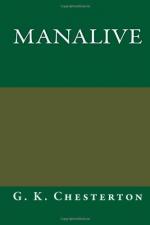Chapter II
The Luggage of an Optimist
We all remember the fairy tales of science in our infancy, which played with the supposition that large animals could jump in the proportion of small ones. If an elephant were as strong as a grasshopper, he could (I suppose) spring clean out of the Zoological Gardens and alight trumpeting upon Primrose Hill. If a whale could leap from the sea like a trout, perhaps men might look up and see one soaring above Yarmouth like the winged island of Laputa. Such natural energy, though sublime, might certainly be inconvenient, and much of this inconvenience attended the gaiety and good intentions of the man in green. He was too large for everything, because he was lively as well as large. By a fortunate physical provision, most very substantial creatures are also reposeful; and middle-class boarding-houses in the lesser parts of London are not built for a man as big as a bull and excitable as a kitten.
When Inglewood followed the stranger into the boarding-house, he found him talking earnestly (and in his own opinion privately) to the helpless Mrs. Duke. That fat, faint lady could only goggle up like a dying fish at the enormous new gentleman, who politely offered himself as a lodger, with vast gestures of the wide white hat in one hand, and the yellow Gladstone bag in the other. Fortunately, Mrs. Duke’s more efficient niece and partner was there to complete the contract; for, indeed, all the people of the house had somehow collected in the room. This fact, in truth, was typical of the whole episode. The visitor created an atmosphere of comic crisis; and from the time he came into the house to the time he left it, he somehow got the company to gather and even follow (though in derision) as children gather and follow a Punch and Judy. An hour ago, and for four years previously, these people had avoided each other, even when they had really liked each other. They had slid in and out of dismal and deserted rooms in search of particular newspapers or private needlework. Even now they all came casually, as with varying interests; but they all came. There was the embarrassed Inglewood, still a sort of red shadow; there was the unembarrassed Warner, a pallid but solid substance. There was Michael Moon offering like a riddle the contrast of the horsy crudeness of his clothes and the sombre sagacity of his visage. He was now joined by his yet more comic crony, Moses Gould. Swaggering on short legs with a prosperous purple tie, he was the gayest of godless little dogs; but like a dog also in this, that however he danced and wagged with delight, the two dark eyes on each side of his protuberant nose glistened gloomily like black buttons. There was Miss Rosamund Hunt, still with the fine white hat framing her square, good-looking face, and still with her native air of being dressed for some party that never came off. She also, like Mr. Moon, had




